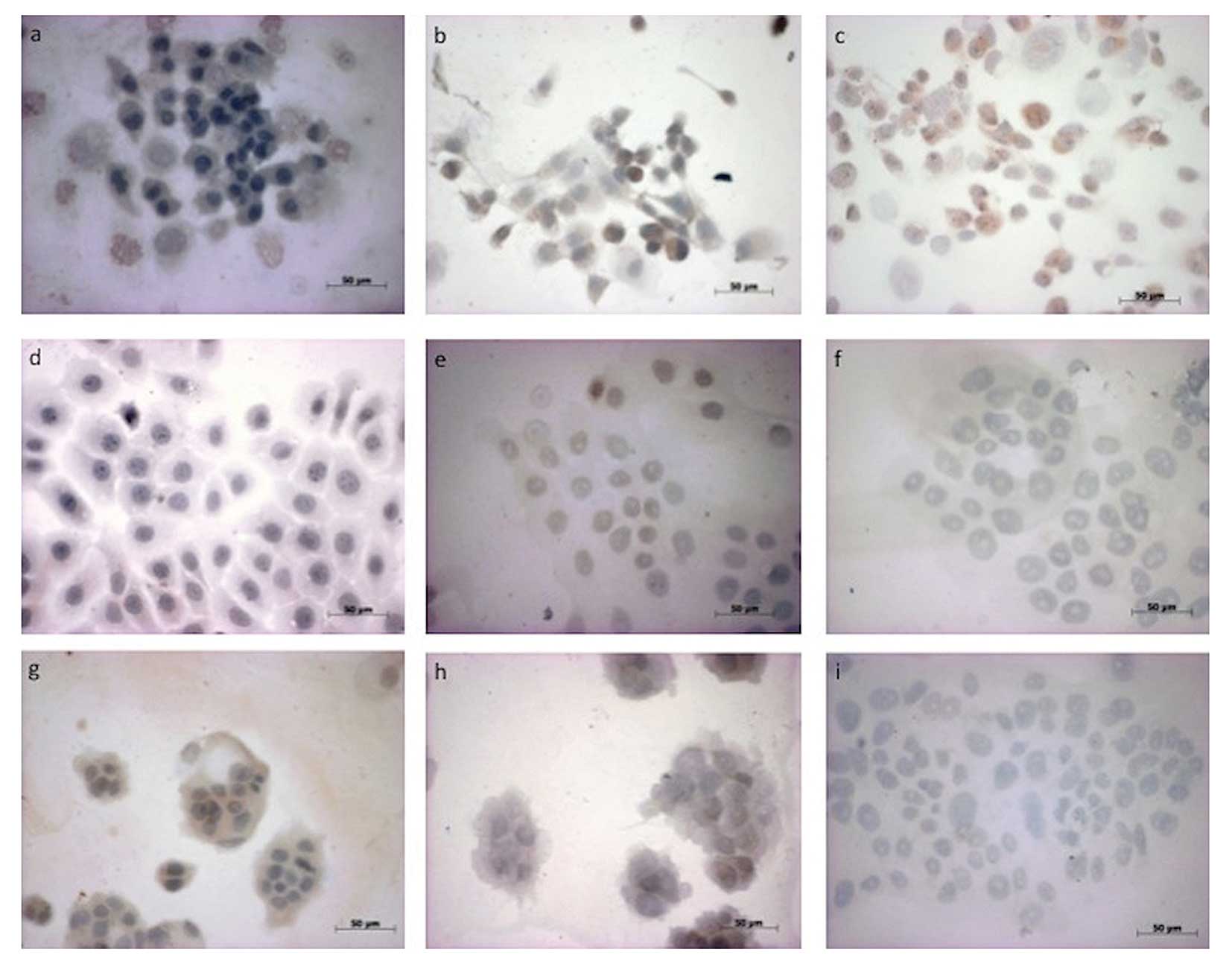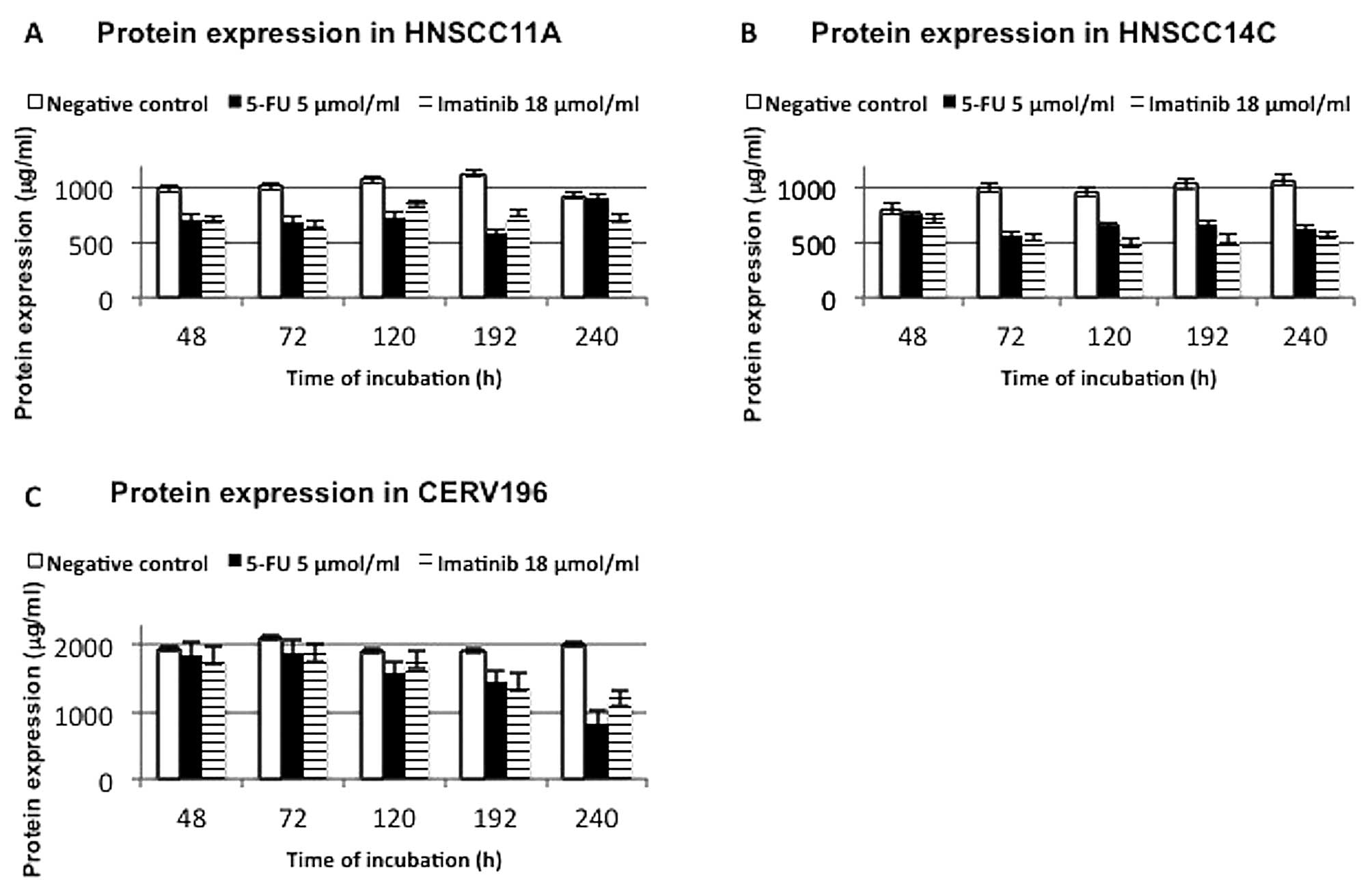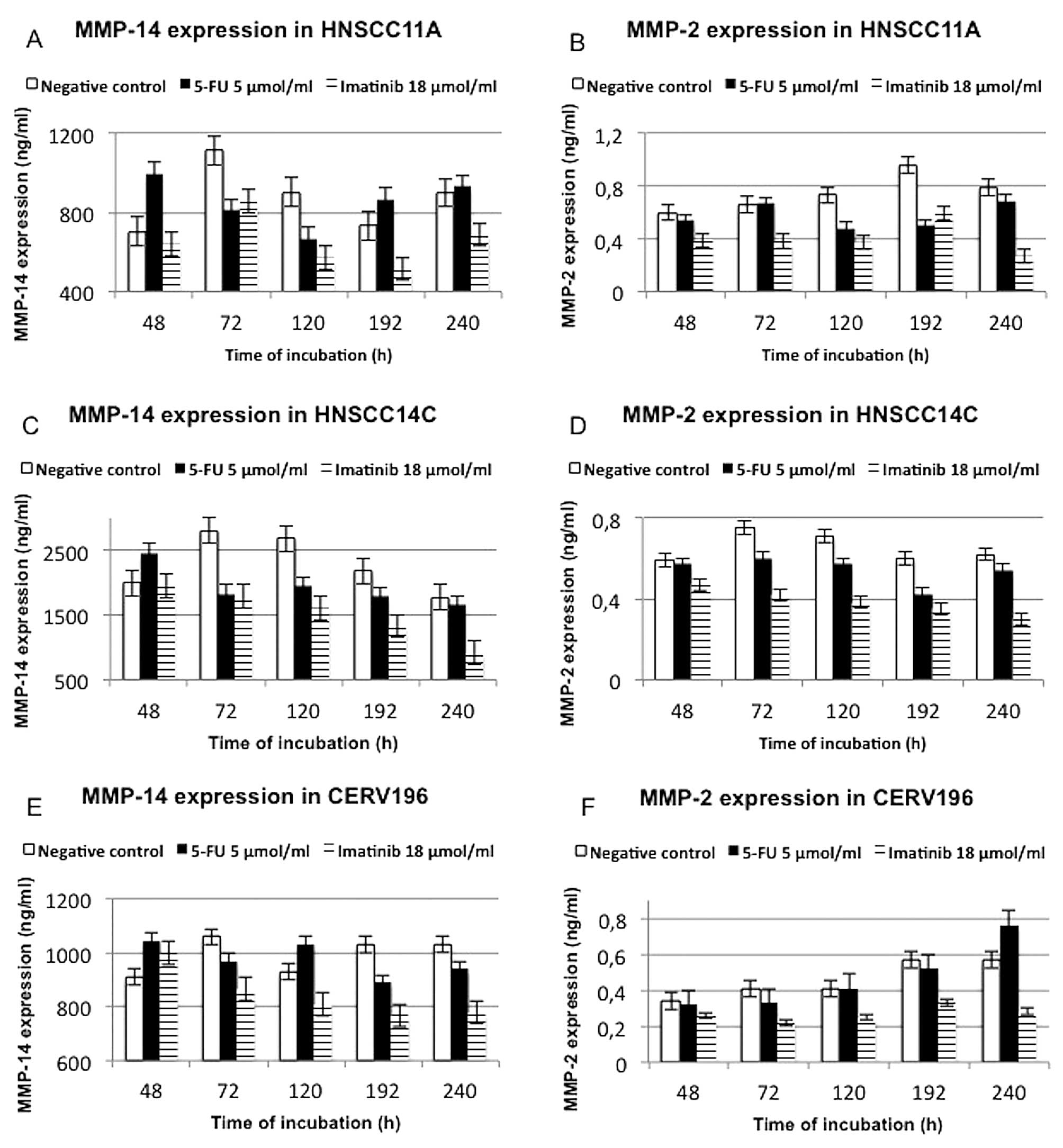|
1
|
Leemans CR, Braakhuis BJ and Brakenhoff
RH: The molecular biology of head and neck cancer. Nat Rev Cancer.
11:9–22. 2011. View
Article : Google Scholar
|
|
2
|
Bodnar M, Szylberg L, Kazmierczak W and
Marszalek A: Differentiated expression of membrane type
metalloproteinases (MMP-14, MMP-15) and pro-MMP2 in laryngeal
squamous cell carcinoma. A novel mechanism J Oral Pathol Med.
42:267–274. 2013. View Article : Google Scholar : PubMed/NCBI
|
|
3
|
Oliveira LR and Ribeiro-Silva A:
Prognostic significance of immunohistochemical biomarkers in oral
squamous cell carcinoma. Int J Oral Maxillofac Surg. 40:298–307.
2011. View Article : Google Scholar : PubMed/NCBI
|
|
4
|
de Vicente JC, Lequerica-Fernandez P,
Santamaria J and Fresno MF: Expression of MMP-7 and MT1-MMP in oral
squamous cell carcinoma as predictive indicator for tumor invasion
and prognosis. J Oral Pathol Med. 36:415–424. 2007.PubMed/NCBI
|
|
5
|
Massano J, Regateiro FS, Januario G and
Ferreira A: Oral squamous cell carcinoma: review of prognostic and
predictive factors. Oral Surg Oral Med Oral Pathol Oral Radiol
Endod. 102:67–76. 2006. View Article : Google Scholar : PubMed/NCBI
|
|
6
|
Schultz JD, Rotunno S, Riedel F, et al:
Synergistic effects of imatinib and carboplatin on VEGF, PDGF and
PDGF-Rα/β expression in squamous cell carcinoma of the head and
neck in vitro. Int J Oncol. 38:1001–1012. 2011.PubMed/NCBI
|
|
7
|
Myoung H, Kim MJ, Lee JH, Ok YJ, Paeng JY
and Yun PY: Correlation of proliferative markers (Ki-67 and PCNA)
with survival and lymph node metastasis in oral squamous cell
carcinoma: a clinical and histopathological analysis of 113
patients. Int J Oral Maxillofac Surg. 35:1005–1010. 2006.
View Article : Google Scholar : PubMed/NCBI
|
|
8
|
Sepiashvili L, Hui A, Ignatchenko V, et
al: Potentially novel candidate biomarkers for head and neck
squamous cell carcinoma identified using an integrated cell
line-based discovery strategy. Mol Cell Proteomics. 11:1404–1415.
2012. View Article : Google Scholar : PubMed/NCBI
|
|
9
|
Bonner JA, Harari PM, Giralt J, et al:
Radiotherapy plus cetuximab for locoregionally advanced head and
neck cancer: 5-year survival data from a phase 3 randomised trial,
and relation between cetuximab-induced rash and survival. Lancet
Oncol. 11:21–28. 2010.PubMed/NCBI
|
|
10
|
Nair S and Pillai MR: Human papillomavirus
and disease mechanisms: relevance to oral and cervical cancers.
Oral Dis. 11:350–359. 2005. View Article : Google Scholar : PubMed/NCBI
|
|
11
|
Sudhoff HH, Schwarze HP, Winder D, et al:
Evidence for a causal association for HPV in head and neck cancers.
Eur Arch Otorhinolaryngol. 268:1541–1547. 2011. View Article : Google Scholar : PubMed/NCBI
|
|
12
|
Schultz JD, Sommer JU, Hoedt S, et al:
Chemotherapeutic alteration of β-catenin and c-kit expression by
imatinib in p16-positive squamous cell carcinoma compared to
HPV-negative HNSCC cells in vitro. Oncol Rep. 27:270–280.
2012.
|
|
13
|
Kreimer AR, Clifford GM, Boyle P and
Franceschi S: Human papillomavirus types in head and neck squamous
cell carcinomas worldwide: a systematic review. Cancer Epidemiol
Biomarkers Prev. 14:467–475. 2005. View Article : Google Scholar : PubMed/NCBI
|
|
14
|
Wang Z, Sturgis EM, Zhang Y, et al:
Combined p53-related genetic variants together with HPV infection
increase oral cancer risk. Int J Cancer. 131:E251–E258. 2012.
View Article : Google Scholar : PubMed/NCBI
|
|
15
|
Shiboski CH, Schmidt BL and Jordan RC:
Tongue and tonsil carcinoma: increasing trends in the U.S.
population ages 20–44 years. Cancer. 103:1843–1849. 2005.PubMed/NCBI
|
|
16
|
Tezal M, Scannapieco FA, Wactawski-Wende
J, et al: Local inflammation and human papillomavirus status of
head and neck cancers. Arch Otolaryngol Head Neck Surg.
138:669–675. 2012. View Article : Google Scholar : PubMed/NCBI
|
|
17
|
Hay ED: The mesenchymal cell, its role in
the embryo, and the remarkable signaling mechanisms that create it.
Dev Dyn. 233:706–720. 2005. View Article : Google Scholar : PubMed/NCBI
|
|
18
|
Tester AM, Ruangpanit N, Anderson RL and
Thompson EW: MMP-9 secretion and MMP-2 activation distinguish
invasive and metastatic sublines of a mouse mammary carcinoma
system showing epithelial-mesenchymal transition traits. Clin Exp
Metastasis. 18:553–560. 2000. View Article : Google Scholar
|
|
19
|
Stamenkovic I: Extracellular matrix
remodelling: the role of matrix metalloproteinases. J Pathol.
200:448–464. 2003. View Article : Google Scholar : PubMed/NCBI
|
|
20
|
Al-Azri AR, Gibson RJ, Keefe DM and Logan
RM: Matrix metalloproteinases: do they play a role in mucosal
pathology of the oral cavity? Oral Dis. 19:347–359. 2013.
View Article : Google Scholar : PubMed/NCBI
|
|
21
|
Martins VL, Caley M and O’Toole EA: Matrix
metalloproteinases and epidermal wound repair. Cell Tissue Res.
351:255–268. 2013. View Article : Google Scholar : PubMed/NCBI
|
|
22
|
de Andres MC, Kingham E, Imagawa K, et al:
Epigenetic regulation during fetal femur development: DNA
methylation matters. PLoS One. 8:e549572013.PubMed/NCBI
|
|
23
|
Tamamura R, Nagatsuka H, Siar CH, et al:
Comparative analysis of basal lamina type IV collagen α chains,
matrix metalloproteinases-2 and -9 expressions in oral dysplasia
and invasive carcinoma. Acta Histochem. 115:113–119. 2013.
|
|
24
|
Folgueras AR, Pendas AM, Sanchez LM and
Lopez-Otin C: Matrix metalloproteinases in cancer: from new
functions to improved inhibition strategies. Int J Dev Biol.
48:411–424. 2004. View Article : Google Scholar : PubMed/NCBI
|
|
25
|
Kaimal R, Aljumaily R, Tressel SL, et al:
Selective blockade of matrix metalloprotease-14 with a monoclonal
antibody abrogates invasion, angiogenesis, and tumor growth in
ovarian cancer. Cancer Res. 73:2457–2467. 2013. View Article : Google Scholar : PubMed/NCBI
|
|
26
|
Mallis A, Teymoortash A, Mastronikolis NS,
Werner JA and Papadas TA: MMP-2 expression in 102 patients with
glottic laryngeal cancer. Eur Arch Otorhinolaryngol. 269:639–642.
2012. View Article : Google Scholar : PubMed/NCBI
|
|
27
|
Gorogh T, Beier UH, Baumken J, et al:
Metalloproteinases and their inhibitors: influence on tumor
invasiveness and metastasis formation in head and neck squamous
cell carcinomas. Head Neck. 28:31–39. 2006. View Article : Google Scholar : PubMed/NCBI
|
|
28
|
Bran B, Bran G, Hormann K and Riedel F:
The platelet-derived growth factor receptor as a target for
vascular endothelial growth factor-mediated anti-angiogenetic
therapy in head and neck cancer. Int J Oncol. 34:255–261.
2009.PubMed/NCBI
|
|
29
|
Heinrich MC, Griffith DJ, Druker BJ, Wait
CL, Ott KA and Zigler AJ: Inhibition of c-kit receptor tyrosine
kinase activity by STI 571, a selective tyrosine kinase inhibitor.
Blood. 96:925–932. 2000.PubMed/NCBI
|
|
30
|
Levitzki A: Tyrosine kinase inhibitors:
views of selectivity, sensitivity, and clinical performance. Annu
Rev Pharmacol Toxicol. 53:161–185. 2013. View Article : Google Scholar : PubMed/NCBI
|
|
31
|
Angelini S, Ravegnini G, Fletcher JA,
Maffei F and Hrelia P: Clinical relevance of pharmacogenetics in
gastrointestinal stromal tumor treatment in the era of personalized
therapy. Pharmacogenomics. 14:941–956. 2013. View Article : Google Scholar : PubMed/NCBI
|
|
32
|
Rutkowski P and Gronchi A: Efficacy and
economic value of adjuvant imatinib for gastrointestinal stromal
tumors. Oncologist. 18:689–696. 2013. View Article : Google Scholar : PubMed/NCBI
|
|
33
|
Longley DB, Harkin DP and Johnston PG:
5-Fluorouracil: mechanisms of action and clinical strategies. Nat
Rev Cancer. 3:330–338. 2003. View
Article : Google Scholar : PubMed/NCBI
|
|
34
|
Klussmann JP, Preuss SF and Speel EJ:
Human papillomavirus and cancer of the oropharynx. Molecular
interaction and clinical implications. HNO. 57:113–122. 2009.(In
German).
|
|
35
|
Scanlon CS, Van Tubergen EA, Inglehart RC
and D’Silva NJ: Biomarkers of epithelial-mesenchymal transition in
squamous cell carcinoma. J Dent Res. 92:114–121. 2013. View Article : Google Scholar : PubMed/NCBI
|
|
36
|
Koontongkaew S: The tumor microenvironment
contribution to development, growth, invasion and metastasis of
head and neck squamous cell carcinomas. J Cancer. 4:66–83. 2013.
View Article : Google Scholar : PubMed/NCBI
|
|
37
|
Stahtea XN, Roussidis AE, Kanakis I, et
al: Imatinib inhibits colorectal cancer cell growth and suppresses
stromal-induced growth stimulation, MT1-MMP expression and pro-MMP2
activation. Int J Cancer. 121:2808–2814. 2007. View Article : Google Scholar : PubMed/NCBI
|
|
38
|
Tsao AS, Liu S, Fujimoto J, et al: Phase
II trials of imatinib mesylate and docetaxel in patients with
metastatic non-small cell lung cancer and head and neck squamous
cell carcinoma. J Thorac Oncol. 6:2104–2111. 2011. View Article : Google Scholar : PubMed/NCBI
|
|
39
|
Popow-Wozniak A, Wozniakowska A, Kaczmarek
L, Malicka-Blaszkiewicz M and Nowak D: Apoptotic effect of imatinib
on human colon adenocarcinoma cells: influence on actin
cytoskeleton organization and cell migration. Eur J Pharmacol.
667:66–73. 2011. View Article : Google Scholar
|
|
40
|
Shiau MY, Fan LC, Yang SC, et al: Human
papillomavirus up-regulates MMP-2 and MMP-9 expression and activity
by inducing interleukin-8 in lung adenocarcinomas. PLoS One.
8:e544232013. View Article : Google Scholar : PubMed/NCBI
|
|
41
|
Cardeal LB, Boccardo E, Termini L, et al:
HPV16 oncoproteins induce MMPs/RECK-TIMP-2 imbalance in primary
keratinocytes: possible implications in cervical carcinogenesis.
PLoS One. 7:e335852012. View Article : Google Scholar : PubMed/NCBI
|
|
42
|
Richter P, Umbreit C, Franz M, et al:
EGF/TGFbeta1 co-stimulation of oral squamous cell carcinoma cells
causes an epithelial-mesenchymal transition cell phenotype
expressing laminin 332. J Oral Pathol Med. 40:46–54. 2011.
View Article : Google Scholar : PubMed/NCBI
|
|
43
|
Qiao B, Johnson NW and Gao J:
Epithelial-mesenchymal transition in oral squamous cell carcinoma
triggered by transforming growth factor-beta1 is Snail
family-dependent and correlates with matrix metalloproteinase-2 and
-9 expressions. Int J Oncol. 37:663–668. 2010.
|
|
44
|
Umbreit C, Aderhold C, Faber A, et al:
Unexpected alteration of β-catenin and c-KIT expression by 5-FU and
docetaxel in p16-positive squamous cell carcinoma compared to
HPV-negative HNSCC cells in vitro. Anticancer Res.
33:2457–2465. 2013.
|
|
45
|
Yasumatsu R, Nakashima T and Komune S:
Overexpression of the orotate phosphoribosyl-transferase gene
enhances the effect of 5-fluorouracil in head and neck squamous
cell carcinoma in vitro. J Oncol. 2012:6496052012.
View Article : Google Scholar : PubMed/NCBI
|
|
46
|
Milano G and Etienne MC: Potential
importance of dihydropyrimidine dehydrogenase (DPD) in cancer
chemotherapy. Pharmacogenetics. 4:301–306. 1994. View Article : Google Scholar : PubMed/NCBI
|
|
47
|
Jiang W, Lu Z, He Y and Diasio RB:
Dihydropyrimidine dehydrogenase activity in hepatocellular
carcinoma: implication in 5-fluorouracil-based chemotherapy. Clin
Cancer Res. 3:395–399. 1997.
|
|
48
|
Kawasaki G, Yoshitomi I, Yanamoto S,
Yamada S, Mizuno A and Umeda M: Expression of thymidylate synthase
and dihydropyrimidine dehydrogenase in primary oral squamous cell
carcinoma and corresponding metastases in cervical lymph nodes:
association with the metastasis suppressor CD82. Anticancer Res.
31:3521–3526. 2011.
|
|
49
|
Tamatani T, Ferdous T, Takamaru N, et al:
Antitumor efficacy of sequential treatment with docetaxel and
5-fluorouracil against human oral cancer cells. Int J Oncol.
41:1148–1156. 2012.PubMed/NCBI
|
|
50
|
Wang P, Nie J and Pei D: The hemopexin
domain of membrane-type matrix metalloproteinase-1 (MT1-MMP) is not
required for its activation of proMMP2 on cell surface but is
essential for MT1-MMP-mediated invasion in three-dimensional type I
collagen. J Biol Chem. 279:51148–51155. 2004. View Article : Google Scholar : PubMed/NCBI
|
|
51
|
Weng CJ, Chen MK, Lin CW, Chung TT and
Yang SF: Single nucleotide polymorphisms and haplotypes of MMP-14
are associated with the risk and pathological development of oral
cancer. Ann Surg Oncol. 19(Suppl 3): S319–S327. 2012. View Article : Google Scholar : PubMed/NCBI
|
|
52
|
Sabeh F, Li XY, Saunders TL, Rowe RG and
Weiss SJ: Secreted versus membrane-anchored collagenases: relative
roles in fibroblast-dependent collagenolysis and invasion. J Biol
Chem. 284:23001–23011. 2009. View Article : Google Scholar : PubMed/NCBI
|
|
53
|
Zarrabi K, Dufour A, Li J, et al:
Inhibition of matrix metalloproteinase 14 (MMP-14)-mediated cancer
cell migration. J Biol Chem. 286:33167–33177. 2011. View Article : Google Scholar : PubMed/NCBI
|

















